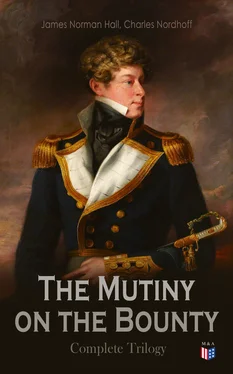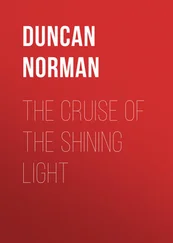This little scene had taken place before many of the ship’s company, and I could see that Christian had controlled his temper with difficulty. Mr. Bligh had the unfortunate habit of making such humiliating remarks to his officers, no matter who might be within hearing. It may be said in his defense, perhaps, that, being a thick-skinned man, he had no conception of how galling such remarks could be, particularly to a man like Christian.
As it chanced, nothing unusual happened that day. The fact that Mr. Bligh had gone off with two of the chiefs was a guarantee that his party would not be molested. Later in the day the natives came off to trade, bringing the usual island produce—pigs, fowls, coconuts, yams, and plantains. The afternoon and the whole of the following day were given up to this business, and the third morning the wood and watering parties were sent ashore in Christian’s charge. It was then that his distrust of the Indians proved fully justified, for we had no sooner set foot on the beach than they began to make trouble for us. Mr. Bligh had not refused to send a guard with the ship’s boats, but he had given strict orders that the arms were not to be used. Hayward was in charge of the cutter and I of the launch, and Christian went with the shore parties. The Indians thronged to the watering place, several hundred yards from the beach. Every effort was made to keep them at a distance, but they became increasingly bold as the work went on, and we had not been half an hour ashore before several of the sailors, who were cutting wood, had had their axes snatched from their hands. Christian performed his work admirably, in the opinion of all the shore party, and it was thanks to his coolness that we were not rushed and overwhelmed by the savages. They outnumbered us fifty to one. We managed to get down our wood and water without coming to a pitched battle, but when we were getting off, toward sundown, they rushed us and managed to make off with the grapnel of the cutter.
When we arrived on board and our losses were reported by Christian, Captain Bligh flew into a rage, cursing him in language that would have been out of place had he been speaking to a common sailor.
“You are an incompetent cowardly rascal, sir! Damn me if you’re not! Are you afraid of a crowd of bloody savages whilst you have arms in your hands?”
“Of what service are they, sir, when you forbid their use?” Christian asked quietly. Bligh ignored this question and continued to pour out such a flood of abuse that Christian turned abruptly and left him, going down to his cabin. When in one of his rages Bligh seemed insane. I had never before met a man of this kind, and my conclusion was, having observed him so often in this state, that he had little recollection, afterward, of what he had said or done. I observed that he frequently worked himself into these passions over matters for which he was really to blame. Being unwilling to admit a fault in his own conduct, it seemed necessary to convince himself, through anger, that the blame lay elsewhere.
Usually, after Bligh had given vent to a fit of this sort, we could promise ourselves several days of calm, during which time he would have little or nothing to say to us, but it chanced that the following day a similar incident occurred which was to have the gravest consequences for all of us. I am no believer in fate. Men’s actions, in so far as their relationships with one another are concerned, are largely under their own control; but there are times when malicious powers seem to order our small human affairs for their own amusement, and one of these occasions must surely have been on the twenty-seventh day of April, in the year 1789.
We had sailed from Namuka on the evening of the twenty-sixth and, the wind being light, had made but little progress during the night. All of the following day we were within seven or eight leagues of the land. The supplies we had received from the Indians were being stored away, and the carpenters were making pens for the pigs and crates for the fowls not intended for early use. Mr. Bligh had kept to his cabin all the morning, but early in the afternoon he appeared on deck to give some instructions to Mr. Samuel, who was in charge of the work of sorting over our purchases at Namuka. A great many coconuts had been piled up on the quarter-deck between the guns, and Bligh, who knew to the last ounce how many yams we had purchased, and the exact number of coconuts, discovered that a few of the latter were missing. He may have been told of this by Samuel, but at any rate he knew it.
He ordered all the officers to come on deck immediately, and questioned each of them as to the number of coconuts he had bought on his own account, and whether or not he had seen any one of the men helping himself to those on the quarter-deck. All denied having any such knowledge, and Bligh, doubtless thinking that the officers were shielding the men, became more and more angry. At length he came to Christian.
“Now, Mr. Christian, I wish to know the exact number of coconuts you purchased for your own use.”
“I really don’t know, sir,” Christian replied, “but I hope you don’t think me so mean as to be guilty of stealing yours?”
“Yes, you bloody hound! I do think so! You must have stolen some of mine or you would be able to give a better account of your own. You’re damned rascals and thieves, the lot of you! You be stealing my yams next, or have the men steal them for you! But I’ll make you suffer! I’ll teach you to steal, you dogs! I’ll break the spirit of every man of you! You’ll wish you’d never seen me before we reach Endeavour Straits!”
Of all the humiliating scenes that had taken place up to that time, this was the worst; and yet, considering the nature of the offense committed, there was something meanly comic about it. Christian, however, could not see this side of the matter, and small wonder that he could not. No other captain in His Majesty’s service would have made such an accusation against his second-in-command, to say nothing of his other officers. Bligh stamped up and down the quarter-deck, his face distorted with passion, shaking his fists and shouting at us as though we were at the other end of the ship. Of a sudden he stopped.
“Mr. Samuel!”
“Yes, sir,” said Samuel, stepping forward.
“You’ll stop the villains’ grog until further orders. And instead of a pound of yams per man you’ll issue half a pound to all the messes. Understand?”
“Yes, sir.”
“And, by God, I reduce you to a quarter of a pound if I find anything else missing, and make you crawl on your bellies for that!”
He then gave orders that all of the coconuts, belonging to officers and men alike, be carried aft to add to the ship’s stores. When this had been done he returned to his cabin.
I never remember the ship to have been more silent than she was that evening. Most of us, doubtless, were thinking of the long voyage ahead. Another year might pass before the Bounty could reach England. Meanwhile we should be under the heavy hand of a captain who could do with us as he pleased; against whose tyranny there could be no appeal. My own mess was particularly silent, for at this time Samuel was a member of it, and we knew that anything we might say would be quickly carried to Captain Bligh. Peckover ate his salt junk and his half a pound of yams in a few savage bites, and withdrew. The rest of us were not long in following.
Mr. Fryer’s watch came on at eight o’clock. Most of the ship’s company were on deck during the early hours, owing to the fineness of the evening. The breeze had been light all day and remained so; we had no more than steerageway, but the air was refreshingly cool. The moon was in its first quarter, and by its light we could dimly see, far ahead, the outline of the island of Tofoa.
Читать дальше











